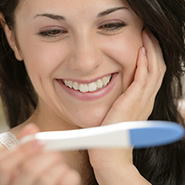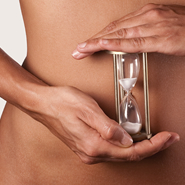
Fertility changes over time
Time passes, habits and lifestyles change, but biological ageing never stops. In women, fertility declines and eventually ends after the age of 45. Things aren't much better for men.
Fertility doesn't last for ever: in women it begins a downward curve just before the age of 30. Age is less of a factor in men, but recent studies have shown that their fertility also declines with the passing of time.
When does fertility start to decrease?
In women, the fertility curve tails off sharply at two precise times: it falls by about 50% after the age of 28, and then decreases again between 35 and 40, reaching zero at about 45. In other words, the last remnants of fertility occur during the pre-menopauseIn women, the fertility curve tails off sharply at two precise times: it falls by about 50% after the age of 28, and then decreases again between 35 and 40, reaching zero at about 45. In other words, the last remnants of fertility occur during the pre-menopause.
Bodies change, but not nature
In the industrialized countries, however, maternal age (the age at which women become mothers) has jumped to between 30 and 35 in the past 20 years. Some scientific studies have shown that as lifestyles change, women remain fertile until an age that would once have been prohibitive. But other research has found that despite improvements in fertility treatment, biological ageing is not affected by social change.
There's no test for fertility
Biomedical science has yet to identify a specific diagnostic test for fertility, and in particular an accurate and sensitive way to quantify a woman's ovarian reserve. This could be useful in determining which is the most suitable fertility treatment, at least in some cases.
The probability of miscarriage increases as fertility declines
As the years pass, the risk of miscarriage rises. The figures speak for themselves: by the age of 40, it is around 40%, twice the figure for a 30-year-old woman..
The legend of permanent male fertility
It seems that the idea that men remain fertile for ever is largely a legend, though there are exceptions that prove the rule: Charlie Chaplin fathered a child in his 70s. Many studies have shown that the number of sperm per millilitre has almost halved in the last 50 years, and it's significant that 35% of cases of infertility are down to the male partner. Today, declining male fertility is partly the result of specific pathologies, but partly also of environmental and lifestyle factors, including increased stress.







